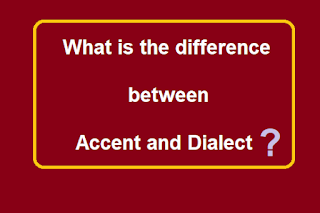The Difference Between 'Accent and Dialect' in English Language
Many people use the terms 'accent' and 'dialect' interchangeably, but they actually have different meanings. In this post, we will explain the difference between accent and dialect in English language, and give some examples of how they vary across regions and countries.
What is an accent?
An accent is a distinct way of pronouncing words in a language. It is influenced by factors such as where you live, where you grew up, your social class, your education, and your exposure to other languages. For example, someone who lives in London might have a different accent from someone who lives in Manchester, even though they both speak English.
An accent affects the sounds of a language, such as which vowels or consonants are stressed, how long they are pronounced, and how they are articulated. For example, some people might pronounce the word 'bath' with a long 'a' sound (as in 'father'), while others might pronounce it with a short 'a' sound (as in 'cat'). An accent does not affect the vocabulary or grammar of a language.
What is a dialect?
A dialect is a variety of a language that has different vocabulary, grammar, and pronunciation from the main form of the language. A dialect is usually spoken by a group of people who share a common geographic area, social class, ethnic background, or historical context. For example, Australian English is a dialect of English that has some words and expressions that are unique to Australia, such as 'mate', 'barbie', and 'g'day'.
A dialect includes an accent, but it also includes other aspects of language use, such as word choice, word order, verb forms, and idioms. For example, some people might use the word 'y'all' to refer to a group of people, while others might use 'you guys' or 'you all'. A dialect can also have different rules for politeness, formality, and humor.
In short, an accent is the particular pronunciation in speech, whereas a dialect is the form a language is spoken and understood. The difference is HOW words are said rather than WHAT words are said
How Do Accents and Dialects Vary in English?
English is a global language that has many accents and dialects around the world. Some of the most well-known varieties of English are:
- British English: This is the standard form of English used in the United Kingdom and some former British colonies. It has several regional accents and dialects within it, such as Cockney, Scottish, Welsh, and Irish.
- American English: This is the standard form of English used in the United States and some neighboring countries. It also has many regional accents and dialects within it, such as Southern, New York, Boston, and African American Vernacular English.
- Canadian English: This is the form of English used in Canada and some parts of the United States near the border. It is similar to American English but has some influences from British English and French.
- Australian English: This is the form of English used in Australia and some neighboring countries. It has some features that are unique to Australia, such as vowel shifts, intonation patterns, and slang words.
- Indian English: This is the form of English used in India and some neighboring countries. It has some influences from Hindi and other Indian languages, such as vocabulary, grammar structures, and pronunciation.
Why are Accents and Dialects Important?
Accents and dialects are important because they reflect the diversity and richness of human language and culture. They also help us identify where someone comes from or what group they belong to. Accents and dialects can also affect how we communicate with others, how we perceive them, and how they perceive us.
Accents and dialects can be sources of pride or prejudice for speakers and listeners. Some people might feel proud of their accent or dialect because it shows their identity or heritage. Others might feel ashamed or insecure about their accent or dialect because it makes them stand out or face discrimination. Some people might admire or respect certain accents or dialects because they associate them with prestige or intelligence. Others might mock or dislike certain accents or dialects because they associate them with ignorance or inferiority.
Accents and dialects can also create challenges or opportunities for communication. Some people might have difficulty understanding or being understood by speakers of different accents or dialects because of unfamiliar words or sounds. Others might enjoy learning about or adapting to different accents or dialects because of curiosity or necessity.
How can we learn more about accents and dialects?
One way to learn more about accents and dialects is to listen to authentic examples of how people speak in different regions and countries. You can find online resources such as podcasts, videos, blogs, and dictionaries that showcase various accents and dialects of English. You can also interact with native speakers or learners of different accents and dialects through online platforms or language exchange programs.
Another way to learn more about accents and dialects is to study the linguistic features and social factors that shape them. You can find online courses, books, articles, and podcasts that explain the phonetic, grammatical, and lexical differences between accents and dialects, as well as the historical, cultural, and political influences that affect them. You can also compare and contrast your own accent or dialect with others and reflect on how they affect your communication and identity.
In conclusion, accents and dialects are fascinating aspects of language that reveal a lot about ourselves and others. By learning more about them, we can appreciate the diversity and complexity of human communication and culture.
Sources:
[1] https://www.bbc.co.uk/programmes/p02pc9zn
[2] https://www.youtube.com/watch?v=riwKuKSbFDs
[3] https://blog.duolingo.com/dialect-vs-accent-definition/
[4] https://www.macmillandictionary.com/learn/british-and-american-terms.html
[5] https://www.fluentu.com/blog/language-exchange-apps/
[6] https://www.futurelearn.com/courses/accents
[7]https://www.amazon.com/Accent-Dialect-English-Language Introductions/dp/1138795420
[8] https://www.babbel.com/en/magazine/accents-and-dialects
[9] https://www.accentricity-podcast.com/


.webp)
.webp)
.webp)

.webp)